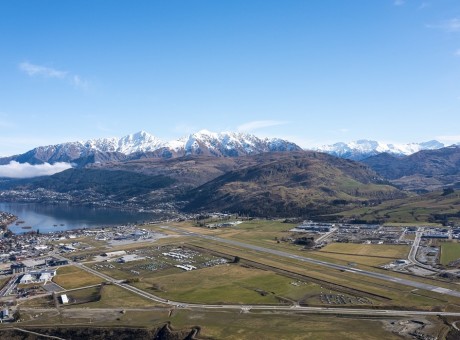Remuneration pool for QLDC's new councillors up 28 per cent

The pool of money available for Queenstown elected members’ salaries has risen 28.3 per cent this council term.
The Independent Remuneration Authority is responsible for setting a governance remuneration pool for elected members excluding the mayor and regional council chairs.
The authority decides the minimum base salary for a councillor and councils themselves are then responsible for allocating the pool between elected members based on responsibilities.
Queenstown Lakes District Council is yet to allocate the pool of money for this term but the authority has already set it at $734,716, 28.2 per cent higher than pre-election when it was $572,864.
The mayor’s salary sits outside this pool and is $165,197 - 6.8 per cent higher than pre-election when it was $154,716.
The remuneration authority also sets a minimum salary for councillors. For QLDC this has jumped 19.8 per cent from $43,820 to $52,480.
When determining a council’s governance remuneration pool the authority considers the size of the governance role of each council, average time required by a local government member on a council of a particular size, and a general comparison with parliamentary salaries. The size of the governance role considers things like population, operating expenditure and asset value.
QLDC mayor John Glover said councillors would agree on a new committee structure at a council meeting next week.

- Mayor John Glover says increased salaries attracts more candidates.
He said, as mayor, his recommendations for pool allocation would need to be approved by the remuneration authority.
"One of the benefits of increasing the amount each councillor receives is that it enables and encourages a larger number of candidates to contest elections and not only is that good for democracy but also has the potential to deliver a more diverse group of councillors locally.
“The workload expected to be managed by councillors is significant and the reality is that there is a very significant time commitment to the role,” Glover said.
“My role is to make sure everyone takes on a fair share of the workload and the community will decide in three years’ time if we have provided a good return on their taxpayer dollars.”
Councillor Cody Tucker has held a second job to supplement his income as councillor. He points out the salaries also don’t include ACC or Kiwisaver contributions.
"I think it's definitely a barrier for younger people to stand because it's more common that people who are on superannuation or other sorts of income or have less debt to service are in a far better position to run for council by nature because of the financial restraint.”
Tucker said his motivation wasn’t money, it was serving the community.
“I've been in this area since I was a kid and I've seen the same problems just getting worse and worse and when I left my last job I was looking to do something more meaningful and help build a community.”
The authority has set Central Otago District Council’s governance remuneration pool at $421,193 and the mayor’s salary at $139,677. The pool is 8 per cent larger than $389,888 pre-election and the mayor’s salary is up 7.4 per cent from $130,074.
Meanwhile, Otago Regional Council has already set its salaries for the remainder of 2025 and 2026.
Pre-election, its remuneration pool was $791,017 and the chair earned $164,562.
Post-election the pool is 9.1 per cent larger at $863,476 and the chair’s salary is up 5.4 per cent from $164,562 to $173,309.
At its November 5 meeting, the regional councillors agreed to remuneration of $105,006 for the deputy chair and $75,847 for portfolio leads, which each councillor is.
Taxpayers' Union spokesman Rhys Hurley said: “Taking the politics out of pay through the Remuneration Authority is fine, but the real problem is that elected members can make costly, poor decisions and face no real accountability until the next election.”
“Councillors often argue the roles are demanding and low paid, but the best way to fix that is by focusing on core services instead of pursuing white-elephant legacy projects that only make their workload and the rates burden bigger.”
The Remuneration Authority completed a full review of its framework this year and found the current system was working well.
The Authority noted variable increases in governance pools across the country, driven by updated data and some evidence of rising workloads, but confirmed no structural change to how local government pay is determined.
All councils were consulted during the review. The Authority noted that while not all councils provided information on hours worked by elected members, workloads had increased in some cases.
Since 2019, the Authority has used a system of size indices to rank councils according to their population, economic activity, expenditure and other factors.
These indices determine total remuneration pools for councillors, which councils then divide based on governance roles such as deputy mayor or committee chair.
The Authority said it would continue to use this approach for the 2025-2028 triennium.
Community board remuneration remains more complex, with significant variation between boards in population, responsibilities and size.
The Authority said developing a single consistent formula for board pay "remains problematic" and it will continue to raise concerns with the Department of Internal Affairs, the Local Government Commission and Local Government New Zealand.
Mayors and regional council chairs are treated as full-time positions, and their pay is set directly by the Authority rather than through council remuneration pools. The Authority's pay scales are benchmarked against Parliamentary salaries, reflecting the leadership and governance responsibilities of the roles.
The new pay rates came into effect after the October 2025 local elections.
- Additional reporting RNZ
| Council | From July 1 to election | Post election | % change |
| QLDC remuneration pool | $572,864 | $734,716 | 28.3% |
| QLDC mayoral salary | $154,716 | $165,197 | 6.8% |
| CODC remuneration pool | $389,888 | $421,193 | 8% |
| CODC mayoral salary | $130,074 | $139,677 | 7.4% |
| ORC remuneration pool | $791,017 | $863,476 | 9.1% |
| ORC chair's salary | $164,562 | $173,309 | 5.3% |
























